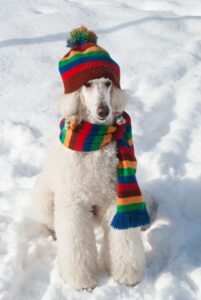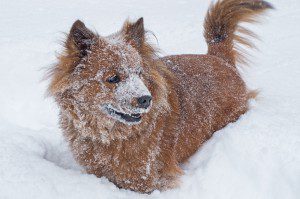As the seasons change and it becomes colder outside pets can feel the difference too. Some pets enjoy the cold but not all do so it’s best to know how to keep them safe. When it comes to keeping them safe common sense is the best way to go, if you are cold most likely they are too. Pets do have fur but just like us they still feel the cold. Always bring your pets in especially if the temperature is 20°F.Cold tolerance is different for each pet. The tolerance depends on the type of coat, how their body stores fat, activity level and over all health of each animal. Even if pets do have a longer coat and are used to the colder weather they should still not be left unattended outside for any length of time and make sure their coat is groomed. (Matted fur doesn’t aid in keeping them warm and can cause skin problems) Shorter coated pets are more sensitive to cold so even little sweaters and booties are a good choice for them. Your pet may appear healthy but cold can make even slight sicknesses worse. If your pet is diabetic, has heart disease, kidney disease, hormonal imbalances they generally have a hard time regulating their body temp. Very young and very old animals are generally prone to having issues with the cold so always keep a close eye on them.

Pets should be kept inside during the colder months but if they do stay outside make sure that they always have food and water. Try to check the water frequently to keep it from freezing and sometimes use heated water bowls. Animals outside should always have shelter and it’s best to be facing away from the wind if possible. The bottom should be kept off the ground and the bedding should be thick and warm. The bedding should be changed regularly to make sure it stays warm and dry. Try to avoid space heaters and heating pads because the pet can burn themselves and it can sometimes catch fire. Also make sure that if your pet is going to be staying outside that they keep a healthy weight through the winter, they will need more calories to help with body heat but it’s best to check with your veterinarian to make sure they don’t gain too much weight.
If you want to make sure your pet is still active during the colder months that’s fine just limit the time they are outside and make sure they are monitored the whole time. Walks are fine but it’s better to shorten them. Always check their feet after being outside to make sure they are not cracked or bleeding. Always clean off ice and snow from paws and try to keep fur between toes cut short. When taking them outside make sure to stay clear of ice, frozen ponds or lakes, pets can fall or fall in and it can become an emergency quickly. Also, make sure they have proper identification at all times when outside just in case they would get away from you.

In addition to just to the cold weather, there are other things to watch for in the colder months. Antifreeze is out a lot in the cold and it smells very sweet to animals but is very deadly. Small amounts can cause major problems for them and sometimes even death. Always watch and make sure any spills are cleaned up right away. Monitor wood stoves, fireplaces, electric blankets, and space heaters because they can burn them very easily. Never leave them in the car because they can be affected by carbon monoxide poisoning and hypothermia. If there is severe weather coming always try to be prepared not only for yourself but your pets as well. An emergency kit is a good option with enough food, water, and medications including heartworm prevention and flea and tick prevention for 5 days. Also try to have extra blankets, leashes, and collars.
